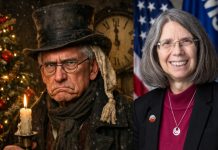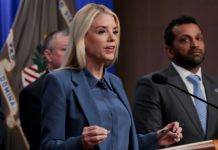Rae’Lee Klein says her experience in Arizona State University’s Cronkite School of Journalism was “mostly positive until recent circumstances arose.”
The university’s Blaze Radio removed her from her managerial position this fall after receiving backlash from the current board, former station directors, and fellow students. Klein had tweeted a New York Post story critical of Jacob Blake, a black man shot last August in Kenosha, Wisconsin.
Now she’s questioning whether ASU is as open-minded as she thought. In fact, Klein told RealClearEducation she “totally disagrees” with the university’s fifth-place ranking in the newly released 2020 College Free Speech Rankings.
While the survey ranking indicates that the taxpayer-funded university protects and defends the First Amendment, some of its students feel that it doesn’t live up to its reputation – though for different reasons.
The 2020 College Free Speech Rankings, conducted by RealClearEducation, College Pulse, and the Foundation for Individual Rights in Education (FIRE), offer a comprehensive comparison of the student experience of free speech on campuses. The findings are based on a survey of approximately 20,000 currently enrolled students and are designed “to help parents and prospective students choose the right college.”
The rankings evaluate 38 public universities and 17 private universities and are predicated on each school’s written policies on free speech as well as a student survey about free expression on campus.
ASU receives a “green light” in FIRE’s ratings, connoting institutions whose policies nominally protect free speech. But while ASU received an overall score of 55.6 out of 100 – less than 9 points behind top-ranked University of Chicago – the survey data and student opinions show that the university has room for improvement.
The open-ended section of the 26-question student survey revealed that students who don’t align with liberal ideologies tend to refrain from expressing their thoughts.
“I feel I cannot express my opinion when a professor publicly makes a negative statement about [President Trump], especially when the topic in class has absolutely nothing to do with that,” wrote one student in the anonymous survey.
“Students on my floor’s lounge could be talking trash about our president and disagreeing with how he is running our country,” wrote another student. “But if I disagreed with what they were saying, they’d just get extremely offended and they would never try to see the situation from a different viewpoint . . . I just don’t say anything because it isn’t worth the backlash.”
Joe Pitts, a second-year business major and president of ASU College Republicans, agrees that certain departments and schools value liberal and radical voices over conservative voices. “ASU does champion free speech, though certain professors, of course, ridicule certain ideas while supporting and praising others,” Pitts wrote in an email to RealClearEducation.
Pranav Chhaliyil, on the other hand, is “extremely proud” of Arizona State’s top-five ranking. “ASU does a fantastic job of promoting inclusivity,” the second-year biological sciences major and president of Asian Corporate & Entrepreneur Leaders wrote in an email.
Removing Opposition
Rae’Lee Klein learned the hard way that ASU’s promises on paper wouldn’t protect her from backlash from her peers at Blaze Radio, an AM radio station operated by the university.
“Always more to the story, folks,” her now-deleted tweet read, linking to the New York Post article about Blake.
“Please read this article to get the background of Jacob Blake’s warrant. You’ll be quite disgusted.”
In a thread roughly six hours later, Klein attempted to clarify the tweet and apologize to anyone she may have offended.
“It was not my intent to make an excuse for what happened to Jacob Blake,” she wrote. “The incident is tragic in every sense of the word. The point of my tweet was to provide an additional perspective.”
Klein soon filed a First Amendment lawsuit against the university, claiming she was removed from her position as station manager for the content of her speech. ASU responded that Klein couldn’t continue to serve because she had “lost the confidence of the student volunteers and board members.” (It filed a motion to dismiss on Nov. 6.)
According to Klein, the lawsuit has been at a “standstill” because “the university has refused to provide a response to our complaint.”
Even before her removal from the station, “I have certainly faced limitations on my free speech as a student there,” Klein told RealClearEducation. She is double majoring in journalism and political science, and she says many of her professors have “pushed a liberal agenda.”
“I have never been someone to hide what I believe and ‘go with the flow,’ so I’ve sparked some debates in classes that left me in poor standing with the professors,” Klein explained in an email to RealClearEducation. “Thankfully, it hasn’t impacted my grades or academic standing (that I know of), but has made me feel like the ‘outcast’ of the class.”
She’s been told by her professors and fellow students that “as a white woman who was born and raised in Wyoming, I can’t cover or talk about diversity issues. Anything I have to say would just be hurtful and ‘too foxnewsy,’” Klein said.
According to Klein, several of her peers were told by Blaze Radio’s former faculty advisor that they had to remove “religious scripture out of their social media bios, because it shows a bias.”
Klein also explained that she had a friend “who was removed from her position as a border correspondent with the school because she wrote a piece about her own parents’ journey as immigrants.”
When asked for additional information about these situations, Klein said that both students wished to remain anonymous.
“The use of fear and consequence is very prominent, leaving most students afraid to share their stories. Another reason I don’t agree with ASU’s ranking!” wrote Klein.
“I think everyone should feel comfortable in sharing their thoughts and beliefs without fearing for their future,” Klein concluded. “I don’t care if someone’s Republican, Democrat, Independent, whatever, their right to free speech and free expression should never be infringed upon, as it so often is in college settings.”
Chilling Effect on Free Speech
Arizona State University can better defend free speech by reining in professors who have a chilling effect on students, according to Pitts, the College Republicans president.
“ASU should work to weed out extensive bias in classrooms and return some of our curriculum away from radical ideologies like critical race theory, and towards pursuing the truth of matters without ideological bias,” he said.
ASU prioritizes “far left” values, according to Rick Thomas, the founder of ASU College Republicans United, which split from the College Republicans following the 2016 election.
The university should “get out of the way and allow the free exchange of ideas on campus to go unhindered,” Thomas wrote to RealClearEducation in an email. The university should not be the “arbitrator” in what is or isn’t acceptable dialogue, he said.
Like Klein, Thomas cites an example of ASU turning on his group.
“At the start of the semester, we pledged to donate half of our contributions towards the lawyer fees” of Kyle Rittenhouse, who is being prosecuted for shooting three people in what he claims was self-defense during the Jacob Blake riots.
That led ASU president Michael Crow to “condemn our group despite acknowledging no violations to university guidelines,” Thomas said.
On Aug. 29, the university tweeted, “While there is no policy prohibiting student groups from raising funds for a cause such as this, ASU does not endorse or support this effort.” The university also said that it would be “meeting with this student group to learn more about this decision.”
Thomas said his group was speaking with lawyers at the Foundation for Individual Rights in Education because ASU is trying to “disenfranchise our voice on campus.” FIRE spokesperson Daniel Burnett confirmed that College Republicans United contacted FIRE but said that he couldn’t provide details.
For his part, Chhaliyil, president of Asian Corporate & Entrepreneur Leaders, has had nothing but good experiences at ASU.
“We have a variety of different cultures, religions, and other demographics represented in our community,” he said. “Students are encouraged to provide feedback and express their ideas and opinions.”
He especially appreciates that ASU “give[s] us the platform to share our ideas and opinions, whether it be through the university-funded events we can host, or the ability to contact important members of the institution.”
RealClearEducation reached out to Arizona State University’s Office of Media Relations and Strategic Communications for comment but did not receive a response prior to publication of this article.
Donovan Newkirk / RealClearWire
Go to Source
Reposted with permission



















![Mandela Barnes Said ‘Reducing Prison Populations is Now Sexy’ [VIDEO] Reducing Prison Populations is Now Sexy](https://www.wisconsinrightnow.com/wp-content/uploads/2022/09/Collage-Maker-14-Sep-2022-11.44-AM-218x150.jpg)




